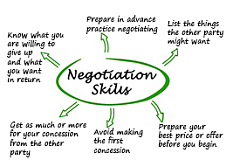 The Law of Win/Win or No Deal says: In a successful negotiation both parties are fully satisfied with the result and feel that they have each “won” or no deal should be made at all.
The Law of Win/Win or No Deal says: In a successful negotiation both parties are fully satisfied with the result and feel that they have each “won” or no deal should be made at all.
Consistent with your determination to enter only into agreements that preserve long-term good relations between the parties, you should always seek an outcome that satisfies both. Remember, you always reap what you sow. Any settlement or agreement that leaves one party dissatisfied will come back to hurt you later, sometimes in ways that you cannot predict.
[quotesright]A very tough negotiator told me proudly about a hard deal he had wrung out of a national organization[/quotesright] for the distribution of his company’s products. He had demanded and threatened and negotiated an agreement that paid him considerably more, both in up-front payments and in percentages of sales, than any of the other clients for which this company distributed.
I happened to know the people on the other side quite well. I later asked them if the story was true. They confirmed that it was. I asked them how they would deal with their other clients when the terms became known, as they surely would. No problem, they told me. They had agreed to pay higher prices and royalties on everything they sold, buy they had not agreed to sell any. And they didn’t.
[quotes]The businessman had negotiated a deal that was a “win/lose,” with him winning and the others losing.[/quotes] But the losing party had no incentive to fulfill the implied commitment to market the products. They had no real incentive to go forward with this person, and no reason to ever want to do business with him again. To this day, they haven’t.
[quotesright]In every ongoing negotiation you should aim for a win/win solution, or no deal.[/quotesright] When you enter into a negotiation where you will be dealing with this person again, you should be clear in advance that you are committed to reach a solution that is satisfactory to both. If it does not entail a win for both parties, you should simply refuse to make any deal at all.
When you are determined to achieve a “win/win” solution to a negotiation, and you are open, receptive and flexible in your discussions, you will often [quotes]discover a third alternative that neither party had considered initially[/quotes] but which is superior to what either of you might have thought of on your own.
For example, a husband and wife may want to take a summer vacation. He is adamant about going to the mountains and getting a chance to hike, and she is equally determined to go to the beach and sit in the sun. One or the other could win while the other loses.
Or, they could compromise and spend half of their vacation in the mountains and half of their vacation at the beach, leaving each of them dissatisfied for half the time. A third alternative however, which could satisfy both of them, might be to go to a city like Vancouver, British Columbia, where the mountains meet the sea.
With this third alternative, during the day she could go to the beach and he could go to the mountains. They could both be together in the late afternoons, evenings and early mornings, and have a fully satisfying family vacation.
This kind of third alternative solution is almost always achievable if you are willing to look for it. It simply requires a commitment to “win/win.”
Once you’ve decided that you are only going to agree to a settlement that is satisfactory to both parties, this doesn’t mean that you have to accept any arrangement that you consider second best. With your values and your intentions clear, you are now in a position to utilize every strategy and tactic available to you to get the very best deal for both of you, one that assures that you both end up happy with the arrangement.
How you can apply this law immediately:
- Think win/win in all your interactions with others, at work and at home. Actively seek a middle way that satisfies the most pressing desires of both parties. Be creative in suggesting alternatives that get both you and the other person more of what you want.
- Examine any situation you are in today that you are not happy with. How could you restructure the terms and conditions in such a way that the other person gets more of what he or she wants in the process of giving you more of what you want?
- from "THE 100 ABSOLUTELY UNBREAKABLE LAWS OF BUSINESS SUCCESS" – Brian Tracy














